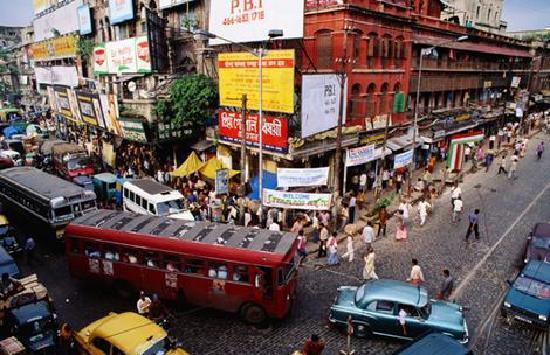Community And Change
Calcutta

Groupism emerges because of the human tendency to relate to different entities by forging labeling mechanisms the moment we find something in common between them. A community, as I see it, is a conglomerate of people who’ve been labeled thus. Initially, I didn’t quite understand the requirement for all this unnecessary fragmentation, until I experienced what it was like to genuinely associate with a community.
In my twenty years of existence, I’ve been grouped based a multitude of different aspects- be it skin color, geographical location, religion, language and even caste. However, the one ‘community’ I distinctively associate myself with is the group of similar young Calcuttans who’ve seen the city, once known as the capital of the British Empire, change from a communist regime to a more liberalized one. The reason I select only ‘young’ Calcuttans in this association is because we’ve been affected by both regimes in an almost balanced manner- unlike the generation before us or after us, we haven’t spent all our forming years knowing only one type of diktat.
A communist inspired party democratically led Calcutta for over three decades. We grew up as children of the millennium, observing the well-settled regime dictate the way working hours were scheduled, celebrating the oftentimes they organized rallies and bundhs which translated into school-off days. We took pride in the fact that the cost of living in our city was lower than other metros. But most of all, we learnt a theory while growing up and learnt in in a more pronounced manner than any textbook could ever teach- by living through its practical implications.
As we began purchasing garments from the Adult section, Calcutta shook off the last withers of the old socialist agenda and donned fresh robes of a new regime- democracy gave way to a more liberalized government- we read of FDI in industry, we saw competitiveness in markets and we understood the meaning of tendering contracts. As a downside, we regretted the increase in prices of daily commodities and good ol’ yellow-and-black taxi fare.
This undulation is something I went through along with several other teenagers and young adults around my age. It affected the way we valued things while growing up. Through the former part, we didn’t care much for appearances- no one would bat an eyelid if we weren’t perfectly groomed or were wearing converse (or the immensely popular ancient trend of Osho) chappals even in a fancy restaurant. We became accustomed to labeling commodities as luxuries and essentials. Not everyone had a shower or a geyser and it didn’t matter. Travelling in a bus or in the metro was the norm and we were proud of it. For the latter part, I was a citizen of the city that faced an attitude change to one where visiting the mall was ‘classy’, the price of your car mattered and all of a sudden, everyone woke up to consider their neighbors as competition.
What happened? Was it more than government change? I’m certain everyone has something other to point to. For me, it’s The Mall- the one that opened doors simultaneously with the sinking in of the new regime. Before its arrival, the Calcutta that I knew didn’t care for Gucci/Louis Vuitton/Micheal Kors/Burberry and the rest. However, once the mall began housing all these brands, the class distinctions became stark. The car that dropped you at the porch or the bags you were seen carrying out with you suddenly played a role in defining who you were. Suddenly, arriving in the comfortably worn out chappals seemed as inappropriate and fine dining at expensive restaurants outweighed visiting the food court or going outside for muri or bhel. I don’t know whether this change is good or bad. However, what I do know is that things aren’t the same as they used to be anymore- vintage car shows wouldn’t only be about the beauty of the vehicle anymore, going shopping wouldn’t just be about getting things you ‘need’ anymore, and purchasing a phone wouldn’t be based on utility alone anymore. In other words, people were changing with the arrival of fancier toys and bourgeoisie ‘hangouts’ and that movement, fighting the long period of collective nonchalance, is what stroke me the most.
I wish there were words to express the speed with which this change came. And in addition to that, since we as a generation, weren’t ‘loyal’ to either the old routine or the newer one, it became tougher for me to form an opinion on it or ‘take sides’. Its only when I realized that I was not the only one facing this dilemma of confusion and helplessness, did I feel a part of something bigger.
Its true- community is simply a label that humans create based on something common. And a changing city taught me why it’s important to retain it. Community for me today is when I can see that look of ‘understanding’ in someone’s eyes when I narrate this occurrence- a feeling based on mutual knowledge and mutual experience. Our community is living through this change every day and hopefully, one day we will too, find our place.



